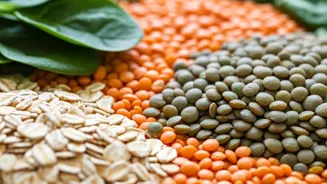World Food Day
World Food Day, celebrated annually on October 16th, commemorates the founding of the United Nations Food and Agriculture Organization in 1945. The core
mission of this day is to combat world hunger, encouraging individuals to consider dietary choices that boost nutritional intake. With many women facing undernourishment, this article provides a list of superfoods to incorporate into their diet for health and strength. It further stresses the importance of a balanced diet in a society that is striving to eradicate hunger and promote overall well-being.
Spinach's Benefits
Spinach, a highly nutritious leafy green, is often overlooked but is a powerhouse of health benefits, particularly for women. Rich in magnesium, spinach helps to alleviate the physical symptoms of premenstrual syndrome (PMS), which many women experience before their periods. It also serves as an immunity booster and contributes to bone strength. Spinach's comprehensive nutritional profile makes it an excellent choice for women seeking to enhance their overall health and well-being through their diet. Its versatility allows for easy incorporation into various meals, making it a convenient way to boost daily nutrient intake.
Lentils: Affordable Power
Lentils are a cost-effective food source packed with essential nutrients. They are among the top plant-based foods, being the third-highest in protein content. This makes them a valuable addition to the diet, especially for women over 40, who require a higher intake of nutrients to support their health. Each type of lentil offers unique nutritional benefits, allowing for dietary variety. Incorporating lentils into meals ensures a good intake of protein and essential minerals to support overall health, which can also help in maintaining a healthy lifestyle.
Oats for Energy
Oats are an excellent source of healthy carbohydrates and fiber, which provides sustained energy throughout the day. Compared to other grains, oats have higher protein and fat content and are filled with vitamins, minerals, and antioxidant plant compounds. Starting the day with oats can help regulate blood sugar levels and maintain energy levels, essential for women managing busy lives. Oats also promote heart health and can aid in weight management, making them a great choice for a balanced diet. Their easy preparation and versatility make oats a convenient breakfast option.
Milk for Bones
Women, especially working women, face a higher risk of reduced bone density, which leads to complications such as osteoporosis. Milk emerges as a good source of calcium, providing the necessary daily dose to maintain bone health. It is also packed with protein, phosphorus, B vitamins, potassium, and vitamin D. The regular consumption of milk can prevent bone-related diseases and support the body's overall function. Adding milk to daily meals is a simple yet effective way to boost calcium intake and protect bone health for the long term.
Broccoli's Protective Role
Broccoli, belonging to the cruciferous vegetable family, is a very healthy food option for women. It helps in maintaining cholesterol levels. Its unique compounds help in reducing estrogen levels, which can reduce the risk of cancer, particularly breast and uterine cancer. Broccoli also has benefits for heart health and contains a good amount of calcium, supporting bone density. Eating broccoli regularly offers a multi-faceted approach to health, helping to prevent various ailments and boost overall well-being. Its inclusion in meals is a step towards a healthier lifestyle.
Beetroot for Digestion
Beetroot is a great source of fiber and is essential for maintaining a healthy digestive system. Beetroot and its juice are linked to several health benefits, including improved blood flow, lower blood pressure, and better exercise performance. These benefits come from the presence of inorganic nitrates in beets. Beetroots and their leaves, also known as beet greens, can be consumed. Including beetroot in the diet supports healthy digestion and offers cardiovascular benefits, improving overall health. It is an easy-to-add and tasty option.
Almonds as Prebiotics
Almonds act as a prebiotic food, meaning that they help in the generation of probiotics when passing through the digestive system. Additionally, a quarter cup of almonds contains more protein than an egg and has a good quantity of magnesium. Regular almond consumption can improve gut health and support overall well-being. Almonds can be enjoyed as a snack, added to meals, or used in various recipes, making them a convenient and nutritious food for women.













